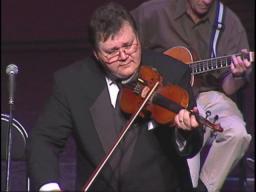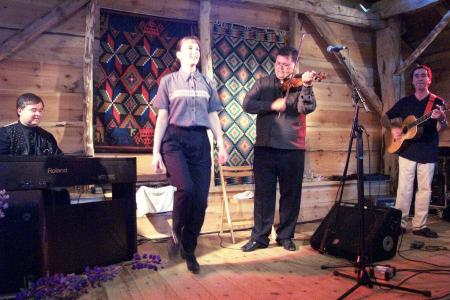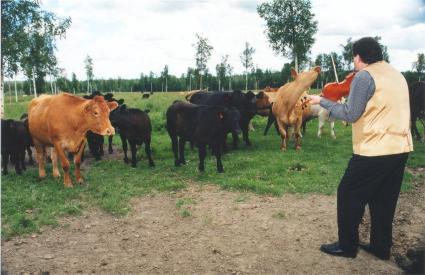
World Famous in Alberta
Canadian fiddler Calvin Vollrath interviewed by Alex Monaghan

|
| Calvin Vollrath on stage |
I first encountered Calvin's name when he was mentioned as a major influence by young Canadian fiddle star Samantha Robichaud. I did a bit of digging on the Internet, and decided it was time we all knew a lot more about this neglected prodigy. Finding a window in the Vollrath schedule (as they say in Canada) wasn't easy, but we managed to arrange a virtual interview. It went something like this.
AM - Tell us a bit about your background.
CV - I was born and raised in Edmonton Alberta, Canada. I am the youngest of
7 children. My father, Art "Lefty" Vollrath was a fiddler. From as early as
I can remember I wanted to be a fiddler. I started at the age of 8 on a half
size fiddle. My dad was not a trained musician but played very well. He wanted
me to be trained so they sent me for lessons, which I didn't like and quit soon
after. I wanted to play like my dad. So I just play by ear. I don't read music.
AM - What were your main influences when you were learning the fiddle?
Were there many fiddlers around?
CV - My dad was my main influence, for sure, but we had records of Don Messer,
Andy Dejarlis, Graham Townsend, Al Cherny and others. I would learn all the
tunes on their records. I also learned how to play guitar and would chord for
my dad. My dad played for dances so his music had a ton of feel to it. That's
what I grew up with. I didn't realize then the feeling he put into it. I just
thought everybody did that. But then you start hearing some others that didn't
quite make your feet tap. There was something missing. All the notes might have
been there but not as exciting as I was used to. So that was my root. Then I
started playing in Country Music bands. Playing back-up fiddle. Lots of Western
Swing and country shuffles. In this music I learned to improvise. This is when
I started composing my own tunes. The Old Time style, like I grew up with, but
adding some different chord patterns. Lots of the tunes we grew up with were
2 or 3 chord tunes. Now I put some diminished and augmented notes into the tunes.
But I still try to keep the tradition of the dance feel.
AM - What was the fiddle scene like in Alberta when you were learning?
CV - I started fiddling in 1968 at 8 years old. I never saw any other fiddlers
until 1974 when I went to my first fiddle contest. There had to be around 50
fiddlers there. I didn't know a soul. There was one fiddler that was very kind
to the new kid on the block. His name was Mel Bedard. I think he finished 2nd.
The other fiddlers didn't pay much attention to me. I thought they were all
great fiddlers, but not very warm in the hospitality department. Oh well, I
was just 13 years of age then. Then we started to go to many contests and started
to get to know the other fiddlers. They were all older than I was. I was pretty
much the only junior. Then a few years after that a few more kids started getting
into the fiddle. Fiddlers all played what was called the Don Messer style. He
had a TV Show in Canada for many years on CBC and became a household name and
that was the Old Time dancing style of fiddling. That's what we were exposed
to and that's what they wanted to hear at fiddle contests. A Waltz, Jig and
a Reel. After getting to know the fiddlers much better, I found some were Ukrainian,
Scottish, Irish, French, Metis and other descents as well, and they played other
kinds of tunes as well. Also some fiddlers grew up listening to American fiddlers.
Dale Potter, for example. Probably the first fiddler to play so many double
stops. He was a hero to many. Tommy Jackson also influenced some fiddlers in
our area. I'm not really sure how fiddlers found out about these American fiddlers
because we didn't see them on TV or hear them on radio. I guess they found records
of them in some stores and heard the different style that was being played and
liked it. I don't think any of the fiddlers in Alberta made their living playing
the fiddle, but most of them played in a band and played dances on the week-ends.

|
| Calvin with his fiddle camp class |
AM - What are your musical influences now?
CV - I still like to listen to fiddle music. Now it's just broader, cause there
are so many styles. I love to put on the old records of the fiddlers I grew
up listening to. I got to be a big fan of Western Swing music, so I listen to
Johnny Gimble from Texas, Wade Ray and Tommy Jackson who played with Ray Price.
Also Stephan Grappelli, & Joe Venutti. I just love the steel guitar. Probably
my favorite musician is a steel player by the name of Buddy Emmons from Nashville.
I try to do things that he does. With a steel guitar, they are bending notes
all the time and play wonderful double stops. Double stops are where you play
two strings at once. I do alot of double stops and try to create steel guitar
type sounds. I picked up a CD of a fiddler while we played in the Shetland Islands
last year, by the name of Gordon Gunn. Amazing!! Also the music played at the
Shetland dances was just wonderful. I have some CDs of that as well that I listen
to.
AM - Yes, I know you were in Shetland last year, but you aren't yet well
known on the east side of the pond. Why do you think that is?
CV - Well I never hooked up with a distributor to get my CDs out to the world.
I've pretty much done it myself. Selling off stage and just meeting people throughout
the country and then a store would call from a certain community, can I get
your recording? So I'd sell them some. I never had a manager or an agent or
anyone promoting me so it takes a bit longer to get the word out. Maybe it makes
my career last longer. I've seen some that get thrown in the spotlight and a
couple of years later you don't hear of them any more. Now I sell my products
on the Internet and that's how they discovered me in the Shetlands. Ivor Scollay
purchased a CD of a Canadian fiddler and read the liner notes and they mentioned
that I was their hero. Well he'd never heard of me, so he searched the Internet
until he found me. Bought a shwack of CDs and became a big fan and said you
have to come and play here. He's an accordion player. No booking agent. But
he put it all together and we tied it into a tour we were doing in the Scandinavian
countries. We just loved the Shetlands and they seem to have taken to our music
as well. We did the Robbie Shepherd show on BBC Radio Scotland when we were
there as well. So that's how the word gets out. I've had the website www.calvinvollrath.com
up and running for about 3 years now. It's amazing how many people check it
out. I'm getting e-mails from folks every day saying they checked out my website
and liked it. I'm not sure it has made a difference in bookings, but selling
on the Internet has been quite good. Now we actually have it so you can purchase
online. It's all advertising, I guess.

|
| Calvin with Shetland pianist Violet Tulloch |
AM - You're a prolific composer of tunes. Where does your inspiration come
from?
CV - When we travel to different places, and they have a different style of
music, I find I write tunes in that style. For instance, I played in Quebec
a few years ago. They have a French Canadian style of fiddling. Very rhythmical.
I came home and wrote 10 tunes like that. Most of the tunes just come to your
head. Driving, walking, golfing, whatever. I always have tunes going through
my head. Then I play them and refine them. Also I write tunes for fiddle fans.
They don't play but I know what they like. I see their reactions to certain
tunes. So when I write a tune, I have a pretty good idea who it's for. I was
commissioned to write a tune for the Fiddles of the World Conference in Halifax
a few years ago. I tried to write a tune that all could play, and have many
types of influences in it. They accepted it and it was played by the 750 fiddlers
in attendance. What an honour that was. Mark O'Connor, Natalie McMaster, Alasdair
Fraser, Byron Berline, and many others. That was a good feeling to hear all
these folks playing my tune

|
| Calvin and Trent Bruner play for step-dancing |
AM - What musicians do you work with?
CV - I have a few different musicians I work with now. Since 1988, Trent Bruner
has been playing the piano with me. He's in much demand in Canada, so the last
few years I've had a piano player from Quebec, Paul Dacier fill in when Trent
can't make it. I also use a guitar player by the name of Freddie Pelletier.
He's is a great musician. Lots of my tunes are a bit different so you can't
just throw anyone in on the piano or guitar. They pretty much need to know the
stuff. I rarely draw up a set list. I always like to play off the cuff.
AM - How do you divide your time between concerts, recording, writing,
and the rest of your life?
CV - For the last 8 years or so, since I've just been back to playing fiddle
music, touring usually starts about June and goes through to October. Sometimes
it will last into November. Then I'm home and this is when I start recording.
The last few years there have been more gigs come in the winter months so that
makes recording a bit tougher, but I love to perform. A call comes in, and away
we go. Last year I only released 3 CDs. People say how come only 3? Well I was
too busy to do more. Writing happens at anytime. I've written as many as 6 tunes
in one day in a car going to Vermont and performed them that night. The piano
player was in the car with me so he heard me humming them and had a good idea
how they would go. I love to golf in the summer, and I like going to movies
in the winter time, when I'm home. Can't beat the big screen and a bowl of popcorn.
I have a beautiful wife named Rhea and 3 wonderful daughters that are all grown
up now: Tanya, Jessica and Jaclyn. I don't have much down time. I never complain
when it's too busy because I remember the times when it wasn't and rent had
to be paid at the end of the week. Yikes...

|
| Calvin's neighbours sing along |
AM - What are your plans for the future?
CV - I just want to keep on doing what we're doing. Things seem to be going
good. Going to more places all the time, but still getting hired at places I've
been doing for years. I teach at many fiddle camps as well and it's nice to
pass on knowledge to the next bunch of fiddlers. With my studio I've also recorded
other performers. Mostly fiddlers but some singers too. I really enjoy that
as well.
AM - When are you likely to be over in Europe again? Do you have plans
to go back to Scandinavia, or Shetland, or Scotland?
CV - I sure hope we can come back to Shetland again. I'm sure it will happen
sometime. If we do Shetland, then we'll try to add others to the tour as well.
We hope to go back to the Scandinavian countries as well. We played the folk
festivals in the those countries and they don't hire the same acts year after
year, but will bring back the odd act that went over good, maybe on special
anniversary years. So we hope to come back to Norway and Sweden in a few years'
time.
So now you know almost as much as I do. Calvin's website www.calvinvollrath.com
is well worth a look, and gives details of all his performances and recordings.
You'll need javascript to view it, but most people have that built in now. Maybe
the name Calvin Vollrath will be more widely known in Europe soon. We'll certainly
be hearing more of his music, from his many pupils and fiddle-playing fans.
More power to his elbow.
Photo Credit: All photos by Alex Monaghan
All material published in FolkWorld is © The Author via FolkWorld. Storage for private use is allowed and welcome. Reviews and extracts of up to 200 words may be freely quoted and reproduced, if source and author are acknowledged. For any other reproduction please ask the Editors for permission. Although any external links from FolkWorld are chosen with greatest care, FolkWorld and its editors do not take any responsibility for the content of the linked external websites.
